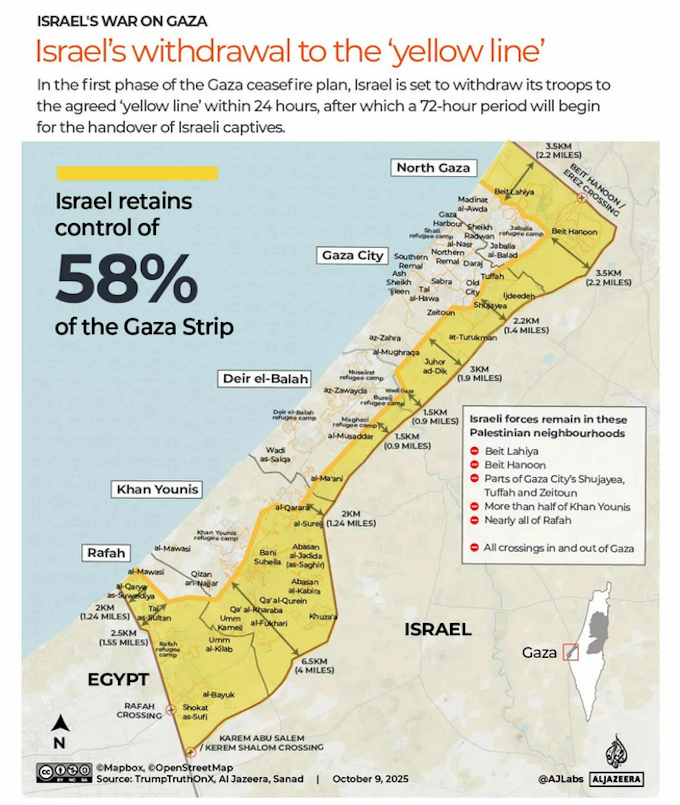This brutal war on Palestinians has not just unleashed Israel’s demons. It has unmasked our own regimes, as they crack down on humanitarian activism. Jonathan Cook reflects on Israel’s war on Gaza as the fragile ceasefire takes hold.
ANALYSIS: By Jonathan Cook
Anniversaries are often a cause for celebration. But who could have imagined back in October 2023 that we would now be marking the two-year anniversary of a genocide, documented in the minutest detail on our phones every day for 24 months? A genocide that could have been stopped at any point, had the US and its allies made the call.
This is an anniversary so shameful that no one in power wants it remembered. Rather, they are actively encouraging us to forget the genocide is happening, even at its very height.
Israel’s relentless crimes against the people of Gaza barely register in our news any longer.
There is a horrifying lesson here, one that applies equally to Israel and its Western patrons. A genocide takes place — and is permitted to take place — only when a profound sickness has entered the collective soul of the perpetrators.
For the past 80 years, Western societies have grappled with — or, at least, thought they did — the roots of that sickness.
They wondered how a Holocaust could have taken place in their midst, in a Germany that was central to the modern, supposedly “civilised”, Western world.
They imagined — or pretended to — that their wickedness had been extirpated, their guilt cleansed, through the sponsorship of a “Jewish state”. That state, violently established in 1948 in the immediate aftermath of the Second World War, served as a European protectorate on the ruins of the Palestinian people’s homeland.
Desperate to control
The Middle East, let us note, just happened to be a region that the West was desperate to keep controlling, despite growing Arab demands to end more than a century of brutal Western colonialism.
Why? Because the region had recently emerged as the world’s oil spigot.
Israel’s very purpose — enshrined in the ideology of Zionism, or Jewish supremacism in the Middle East — was to act as a proxy for Western colonialism. It was a client state planted there to keep order on the West’s behalf, while the West pretended to withdraw from the region.
This big picture — the one Western politicians and media refuse to acknowledge — has been the context for events there ever since, including Israel’s current, genocidal endgame in Gaza.
Two years in, what should have been obvious from the start is becoming ever-harder to ignore: the genocide had nothing to do with Hamas’s one-day attack on Israel on 7 October 2023. The genocide was never about “self-defence”. It was preordained by the ideological imperatives of Zionism.
Hamas’s break-out from Gaza — a prison camp into which Palestinians had been herded decades earlier, after their expulsion from their homeland — provided the pretext. It all too readily unleashed demons long lurking in the soul of the Israeli body politic.
And more importantly, it released similar demons — though better concealed — in the Western ruling class, as well as parts of their societies heavily conditioned to believe that the interests of the ruling class coincide with their own.
Bubble of denial
Two years into the genocide, and in spite of this week’s fragile ceasefire negotiated by US President Donald Trump and the three mediators, Egypt, Qatar and Türkiye, the West is still deep in its self-generated bubble of denial about what has been going on in Gaza – and its role in it.
“History repeats itself,” as the saying goes, “first as tragedy, then as farce.”
The same could be said of “peace processes”. Thirty years ago, the West force-fed Palestinians the Oslo Accords with the promise of eventual statehood.
Oslo was the tragedy. It led to an ideological rupture in the Palestinian national movement; to a deepening geographic split between an imprisoned population in the occupied West Bank and an even more harshly imprisoned population in Gaza; to Israel’s increasing use of new technologies to confine, surveil and oppress both sets of Palestinians; and finally, to Hamas’s brief break-out from the Gaza prison camp, and Israel’s genocidal “response”.
Now, President Trump’s 20-point “peace plan” offers the farce: unapologetic gangsterism masquerading as a “solution” to the Gaza genocide. Former British Prime Minister Tony Blair — a war criminal who, alongside his US counterpart George W Bush, destroyed Iraq more than two decades ago — will issue diktats to the people of Gaza on Israel’s behalf.
Gaza, not just Hamas, faced an ultimatum: “Take the deal, or we will put you in concrete boots and sink you in the Mediterranean.”
Surrender document
Barely veiled by the threat was the likelihood that, even if Hamas felt compelled to sign up to this surrender document, Gaza’s people would end up in concrete boots all the same.
Gaza’s population has been so desperate for a respite from the slaughter that it would accept almost anything. But it is pure delusion for the rest of us to believe a state that has spent two years carrying out a genocide can be trusted either to respect a ceasefire or to honour the terms of a peace plan, even one so heavily skewed in its favour.
The farce of Trump’s peace plan — his “deal of the millennium” — was evident from the first of its 20 points: “Gaza will be a deradicalised terror-free zone that does not pose a threat to its neighbours.”
The document’s authors no more wonder what might have “radicalised” Gaza than Western capitals did when Hamas, which is proscribed as a terrorist group in the UK and other countries, broke out of the prison enclave with great violence on 7 October 2023.
Were the people of Gaza simply born radical, or did events turn them radical? Were they “radicalised” when Israel ethnically cleansed them from their original lands, in what is now the self-declared “Jewish state” of Israel, and dumped them in the tiny holding pen of Gaza?
Were they “radicalised” by being surveilled and oppressed in a dystopian, open-air prison, decade upon decade? Was it the experience of living for 17 years under an Israeli land, sea and air blockade that denied them the right to travel or trade, and forced their children on to a diet that left them malnourished?
Or maybe they were radicalised by the silence from Israel’s Western patrons, who supplied the weaponry and lapped up the rewards: the latest confinement technologies, field-tested by Israel on the people of Gaza.
Gaza most extreme
The truth ignored in the opening point of Trump’s “peace plan” is that it is entirely normal to be “radicalised” when you live in an extreme situation. And there are no places on the planet more extreme than Gaza.
It is not Gaza that needs “deradicalising”. It is the West and its Israeli client state.
The case for deradicalising Israel should hardly need stating. Poll after poll has shown Israelis are not just in favour of the annihilation their state is carrying out in Gaza; they believe their government needs to be even more aggressive, even more genocidal.
This past May, as Palestinian babies were shrivelling into dry husks from Israel’s blockade on food and aid, 64 percent of Israelis said they believed “there are no innocents” in Gaza, a place where around half of the population of two million people are children.
The figure would be even higher were it reporting only the views of Israeli Jews. The survey included the fifth of the Israeli population who are Palestinians — survivors of mass expulsions in 1948 during Israel’s Western-sponsored creation. This much-oppressed minority has been utterly ignored throughout these past two years.
Another survey conducted earlier this year found that 82 percent of Israeli Jews favoured the expulsion of Palestinians from Gaza. More than half, 56 percent, also supported the forced expulsion of Palestinian citizens of Israel — even though that minority has kept its head bowed throughout the genocide, for fear of reaping a whirlwind should it speak up.
In addition, 47 percent of Israeli Jews approved of killing all the inhabitants of Gaza, even its children.
Netanyahu’s crimes
The crimes overseen by Israeli Prime Minister Benjamin Netanyahu, who is so often held up by outsiders as some kind of aberration, are entirely representative of wider public sentiment in Israel.
The genocidal fervour in Israeli society is an open secret. Soldiers flood social media platforms with videos celebrating their war crimes. Teenage Israelis make funny videos on TikTok endorsing the starvation of babies in Gaza. Israeli state TV broadcasts a child choir evangelising for Gaza’s annihilation.
Such views are not simply a response to the horrors that unfolded inside Israel on 7 October 2023. As polls have consistently shown, deep-seated racism towards Palestinians is decades old.
It is not former Defence Minister Yoav Gallant who started the trend of calling Palestinians “human animals”. Politicians and religious leaders have been depicting them as “cockroaches”, “dogs”, “snakes” and “donkeys” since Israel’s creation. It is this long process of dehumanisation that made the genocide possible.
In response to the outpouring of support in Israel for the extermination in Gaza, Orly Noy, a veteran Israeli journalist and activist, reached a painful conclusion last month on the +972 website: “What we are witnessing is the final stage in the nazification of Israeli society.”
And she noted that this problem derives from an ideology with a reach far beyond Israel itself: “The Gaza holocaust was made possible by the embrace of the ethno-supremacist logic inherent to Zionism. Therefore it must be said clearly: Zionism, in all its forms, cannot be cleansed of the stain of this crime. It must be brought to an end.”
As the genocide has unfolded week after week, month after month — ever-more divorced from any link to 7 October 2023 — and Western leaders have carried on justifying their inaction, a much deeper realisation is dawning.
Demon in the West
This is not just about a demon unleashed among Israelis. It is about a demon in the soul of the West. It is us — the power bloc that established Israel, arms Israel, funds Israel, indulges Israel, excuses Israel — that really needs deradicalising.
Germany underwent a process of “denazification” following the end of the Second World War — a process, it is now clear from the German state’s feverish repression of any public opposition to the genocide in Gaza, that was never completed.
A far deeper campaign of deradicalisation than the one Nazi Germany was subjected to, is now required in the West — one where normalising the murder of tens of thousands of children, live-streamed to our phones, can never be allowed to happen again.
A deradicalisation that would make it impossible to conceive of our own citizens travelling to Israel to help take part in the Gaza genocide, and then be welcomed back to their home countries with open arms.
A deradicalisation that would mean our governments could not contemplate silently abandoning their own citizens — citizens who joined an aid flotilla to try to break Israel’s illegal starvation-siege of Gaza — to the goons of Israel’s fascist police minister.
A deradicalisation that would make it inconceivable for British Prime Minister Keir Starmer, or other Western leaders, to host Israel’s President, Isaac Herzog, who at the outset of the slaughter in Gaza offered the central rationale for the genocide, arguing that no one there — not even its one million children — were innocent.
A deradicalisation that would make it self-evident to Western governments that they must uphold the World Court’s ruling last year, not ignore it: that Israel must be forced to immediately end its decades-long illegal occupation of the Palestinian territories, and that they must carry out the arrest of Netanyahu on suspicion of crimes against humanity, as specified by the International Criminal Court.
A deradicalisation that would make it preposterous for Shabana Mahmood, Britain’s Home Secretary, to call demonstrations against a two-year genocide “fundamentally un-British” — or to propose ending the long-held right to protest, but only when the injustice is so glaring, the crime so unconscionable, that it leads people to repeatedly protest.
Eroding right to protest
Mahmood justifies this near-death-knell erosion of the right to protest on the grounds that regular protests have a “cumulative impact”. She is right. They do: by exposing as a sham our government’s claim to stand for human rights, and to represent anything more than naked, might-is-right politics.
A deradicalisation is long overdue — and not just to halt the West’s crimes against the people of Gaza and the wider Middle East region.
Already, as our leaders normalise their crimes abroad, they are normalising related crimes at home. The first signs are in the designation of opposition to genocide as “hate”, and of practical efforts to stop the genocide as “terrorism”.
The intensifying campaign of demonisation will grow, as will the crackdown on fundamental and long-cherished rights.
Israel has declared war on the Palestinian people. And our leaders are slowly declaring war on us, whether it be those protesting the Gaza genocide, or those opposed to a consumption-driven West’s genocide of the planet.
We are being isolated, smeared and threatened. Now is the time to stand together before it is too late. Now is the time to find your voice.
Jonathan Cook is a writer, journalist and self-appointed media critic and author of many books about Palestine. Winner of the Martha Gellhorn Special Prize for Journalism. Republished from the author’s blog with permission. This article was first published by the Middle East Eye and is republished with the author’s permission.
This post was originally published on Asia Pacific Report.

















 Reform UK Durham Leaders calling for more pay.
Reform UK Durham Leaders calling for more pay. (@reformexposed)
(@reformexposed)